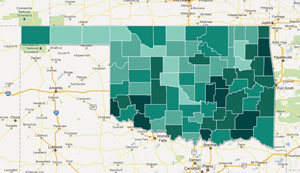
Reader Reactions: ‘Small Towns are Dying’
-
Joe Wertz
Poverty in Oklahoma is at a 10-year high, and many of our commenters have been feeling the effects.
Responding to our series of interactive maps that explores the state’s poverty county-by-county, commenter “Dave” said small American towns are turning into poor villages:
Industry has no incentive to build plants in smaller towns as they did in the 40’s and 50’s, and military bases are closing. Those two factors — and farming — are why small towns could exist in the first place. Now all that’s left is agriculture and maybe some raw material production.

Jimmywayne / Flickr
Waurika is in Jefferson County, which had a 21.6 percent poverty rate in 2010, according to an estimate by the U.S. Census Bureau.
Commenter “Ryan” said there are simply “no jobs available” in Waurika, a town he describes as having more dollar stores than grocery stores. Ryan’s county, Jefferson, has a 32.2 poverty rate among Oklahomans under 18, which he said creates interesting competition for jobs:
With the older residents looking for the same jobs as our teens, we simply don’t have anywhere to work except out of town, which was a viable choice back before the economy was in such bad shape.
While more populous counties rank in the middle of the poverty pack — 17.6 percent among all-ages for Oklahoma County; 15.8 percent in Tulsa County — commenter “Mcdigi,” who taught music in Oklahoma City for 15 years before moving to a small town, said things aren’t any better in urban inner-cities.
“Kids are falling through the cracks. Teachers at our school buy shoes for some of their kiddos out of their own pockets.”
Commenter “Brett” had a mixed feeling about Oklahoma’s poverty numbers:
On one hand, jobs are limited … on the other hand, it seems like a lot of people aren’t even wanting to work. A casino opened about five years ago in my hometown (Holdenville) and they actually had to delay the grand opening because they couldn’t find people willing and able to work for them.
“Angi” reacted to other comments about educational requirements being a barrier for employment:
I attended OSU and in my last year found out how truly limiting my degree plan was when I began looking for employment. The same thing happened to my boyfriend … We both got sucked into what we were told were the latest, greatest degree plans, which to us meant we were sure to get jobs.
Finding jobs in fields relating to Angi and her boyfriend’s degrees would have required moving out of state. Both found jobs, she wrote, but they’re not “ideal:”
We’re broke as can be but we are happy and living where we get to see our loved ones regularly, and you really can’t ask for a lot more than that.


